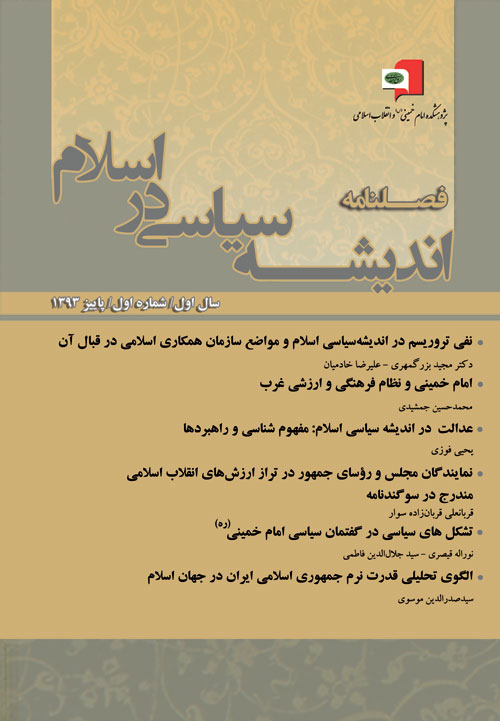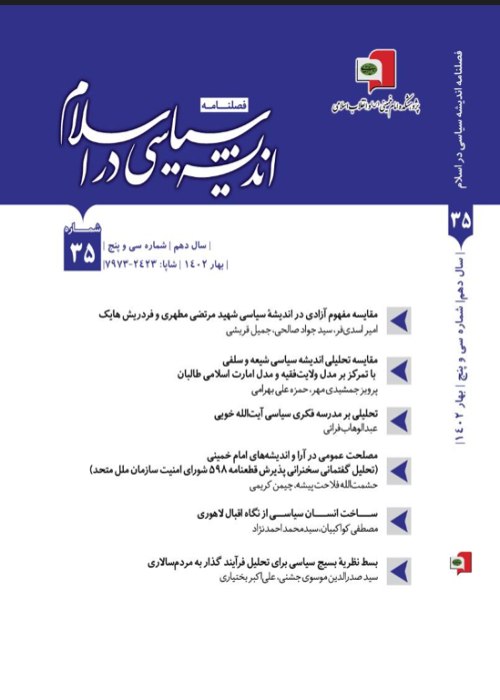فهرست مطالب

نشریه اندیشه سیاسی در اسلام
پیاپی 1 (پاییز 1393)
- 184 صفحه، بهای روی جلد: 10,000ريال
- تاریخ انتشار: 1393/09/25
- تعداد عناوین: 6
-
Page 1The principles of Islamic faith explicitly and implicitly condemn terrorist acts and terrorism, as we read in the Holy Quran (Maidah: 32) about it. While condemning terrorism, in all its forms and manifestations, Islam makes a distinction between national freedom and anti-occupation movements and terrorism. Supporting the oppressed people of Palestine against Israeli atrocities is a crystal clear example for the above claim. However, the West has called this legitimate right of support an instance of terrorist act and has launched massive propaganda in this connection. Insuch a situation, the status of Organization of Islamic Cooperation (OIC), as a pervasive international Islamic organization, is very sensitive. Since OIC can clarify official stances of Islamic states as an official international organization, studying OIC stance vis-à-vis terrorism will be a great help in presenting an overall image of the attitude of the world of Islam toward this ill phenomenon. Our key question in this paper centers round modalities of OIC stance vis-à-vis terrorism and the subordinate question will be paying attention to Islamic jurisprudence literature. In this research paper, we will discuss major indexes on fighting terrorism that are available in the OIC documents, specially the OIC Convention on Combating Terrorism.Keywords: terrorism, Organization of Islamic Cooperation, United Nations, world of Islam
-
Page 29The Islamic Revolution of Iran introduced new values to the humanity and reshaped our identity. One of the consequences of this revolution was inspiring the change in our point of view toward the West and toward the status of the contemporary world. On this basis, there is a dire need to adopt a stance appropriate to the values of Islamic Revolution and its Iranian-Islamic identity against the West and its culturalaxiological system. As the ideologist and leader of the Islamic Revolution and founder of the Islamic Republic, Imam Khomeini introduced an approach to theWest that is concordant with and conforming to the generality of our culture on one hand, and on the other hand, pictures our revolutionary stance vis-à-vis the West. On this basis, our major question will be: What stance does Imam Khomeini picture for our revolutionary society vis-à-vis the West and its cultural, axiological and ideological system? Imam Khomeini’s approach centers round not only rejecting Occidentalism, but also negating any tendency toward Western culture in its diversified forms with respect to such factors and principles as humanism, materialism and secularism, individualism, and hegemony. His approach prescribes resistance against aggressive behavior of the West and introducing the plan for revival of Iranian-Islamic identity via trust in God, the Initiator of the world of being. In this approach, the West is a symbol of the fall of the belief in the Holy Truth and the East is the symbol of the rise of the belief in the Holy Truth and manifestation of Light, based on which man returns to his real “self” or to his divine innate nature, thus steps in the path of spiritual perfection and real salvation by rejecting Occidentalism.Keywords: Imam Khomeini, the West, Occidentalism, Westernization, humanism, the East, return to the self
-
Page 59Given the importance of justice in Islam, this research paper dwells on the question of “what the concept of justice in political thought of Islam is, and what its characteristics are”. Our subordinate question is: What strategies can help realization of political justice? Since justice is closely associated with rights in terms of concept, this paper intends to embark on index construction for political justice based on the concept of rights by applying interpretive-analytical method. Based on the findings of this paper, if we consider people and government as beneficiaries of political activities, then we should say that mutual granting of political rights between people and government will pave the ground for realization of political justice. Strategies for realization ofthis justice, on one hand, need identifying divine-innate rights of individuals and government and on the other hand, enforcement of the individual and social rights agreed upon among the people themselves or between the people and the government. In this connection, considering constant abidance by Islamic law, using collective wisdom, and expert-level findings in various related fields can be among other strategies for realization of political justice.Keywords: justice, political justice, rights, political thought of Islam
-
Page 91Constitutional law plays a key role in a political system both in policymaking and in decision-making. It is taken as the code of action by the people and officials equally. Constitutional law serves as a pulse for the political system. The degree of enforcement of the rules, realization of ideals and values stipulated in the constitutional law, such as oaths, show the soundness, consolidation and sustainability of the political system. Any violation from or ignorance of the enforcement of chapters and principles of the constitutional law will impose serious damages on the system and people in various fields. This research paper intends to collect and describe people’s evaluation of the degree of abidance by the Parliamentary Oath and Oath of Office by the members of the parliament (MP) and presidents of the Islamic Republic of Iran during the past thirty years. The research method we have applied in this paper is “survey” with a descriptive approach. In August 2008, questionnaires were distributed in the city of Qazvin on the degree ofthe enforcement of the articles of the Parliamentary Oath and Oath of Office by the members of the parliament (MP) and presidents. The results were like this: 38 percent of the respondents evaluated as “good and very good” in response to the question on the degree of enforcement of Parliamentary Oath by the MPs during the past thirty years, while 33 percent marked “median” and 29 percent evaluated their performance in this connection as “weak and very weak”. Similarly 38 percent of the respondents evaluated as “median” in response to the question on the degree ofenforcement of the Oath of Office by the presidents during the past thirty years, while 34 percent marked “good and very good” and 28 percent evaluated their performance as “weak and very weak”.Keywords: constitutional law, oath, member of the parliament (MP), president, Islamic Republic of Iran
-
Page 119Popularization, democracy, and democratic political regime have always been associated with certain demands and requirements, as the reality of a political affair in contemporary world suggests. These requirements, although parts of which are not included in the innate structure of popularization and democratization of politics and political regimes, are important in establishment and sustainability of the political situation. Organization of the political activities is among suchrequirements manifested in diversified forms in political practice. Political organizations are also diversified depending upon the culture and nature of political regime and ideology. In Iran, the Islamic Revolution, a popular revolution led by Imam Khomeini, put an end to the dictator regime of Shah. Establishment of the Islamic Republic system of government, that was based on and inspired by Islam’s religious codes and instructions and in line with realization of public demands inIranian society, marked a new age in politics that constituted its structure on public vote. As there were many diversified opinions in the early years after the victory of Islamic revolution on the nature and structure of the Islamic rule, opinions on the nature, function and structure of political organizations were also different. Imam Khomeini’s precise opinion on Islamic rule, who said “Islamic Republic, nothing more, nothing less”, and people’s majority “Yes” vote to the Islamic Republic system of government in massive turnout in March 1979 public referendum put an end to all debates on the nature and structure of the political system. But questions are still unanswered on the nature and structure of political organizations. This paper intends to shed light on the unknown and hidden aspects of this discussion through clarifying Imam Khomeini’s viewpoints. The research method in this paper is exploratory and analytical resting upon discourse analysis approaches.Keywords: Imam Khomeini, political organization, party, Imam Khomeini's political discourse, Islamic Republic
-
Page 147The Islamic Revolution of Iran can be introduced as the turning point in application of soft power on domestic and international policy, the outstanding characteristics of which can be using violence-free soft power in the course of political and social developments. After the victory of Islamic Revolution in Iran, the software power approach turned into one of the power application alternatives in international level, so that violating the indicators and sources of soft power by a political player became a defect in his career. Today, all countries seek access to soft power capabilities and resources. Therefore, the Islamic Republic of Iran needs soft power if it wants to turn into a regional power. This is why identifying the indices and sources of soft power is very important for the Islamic Republic of Iran. Given the above, this research paper intends to provide a response to this question that “what indexes exert maximum influence on I. R. of Iran’s soft power in the world of Islam?” Findings of this paper show that such indicators as inspiration, normalization and deepening of strategic depth, identity recognition by Muslims, cultural diplomacy, world public opinion management, scientific supremacy and knowledge acquisition, gaining capability in art and culture are more influential and efficient in boosting Iran’s soft power in the world of Islam.Keywords: soft power, Islamic Republic of Iran, world of Islam, normalization, aspiration, cultural diplomacy, scientific supremacy, cultural influence


